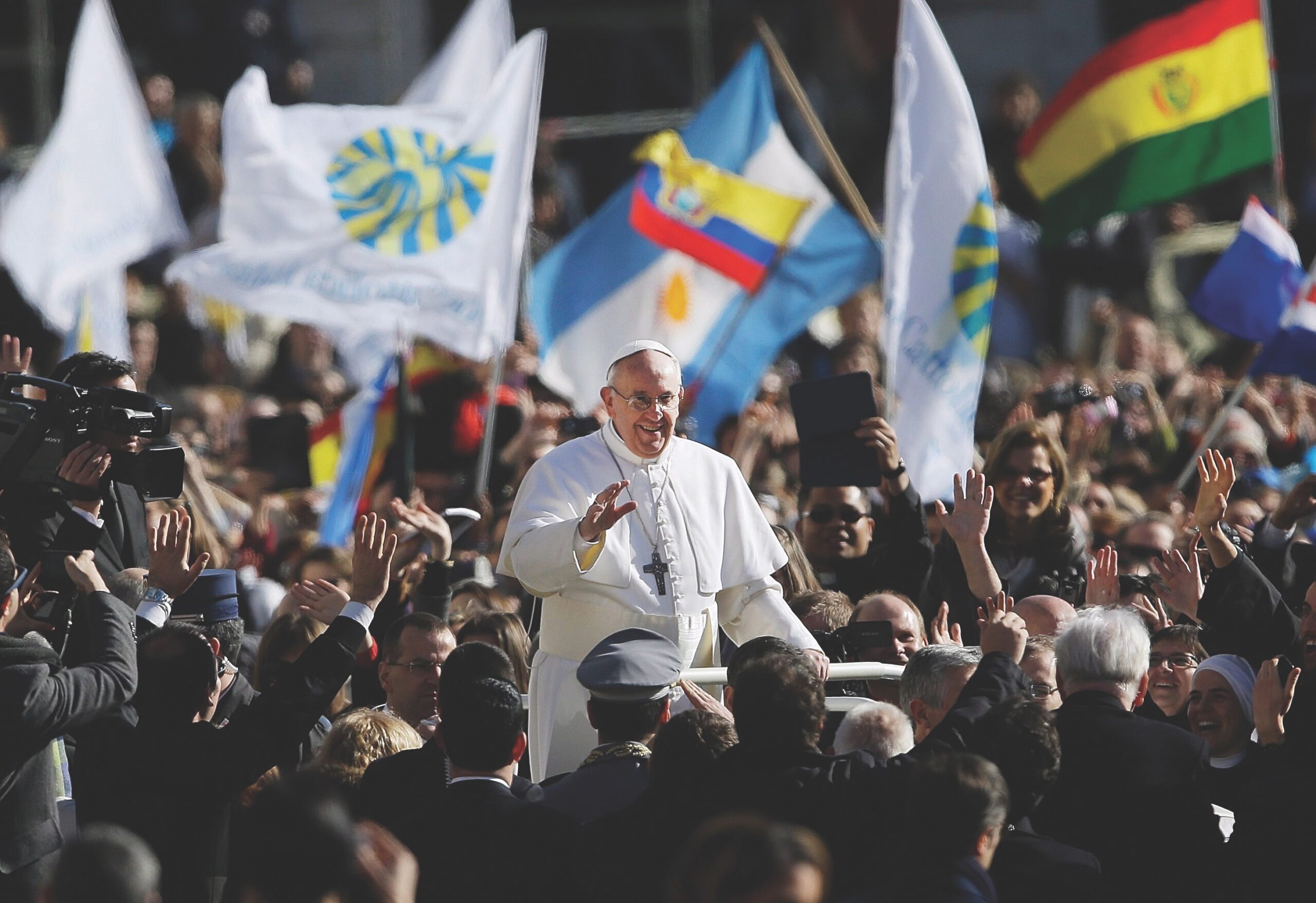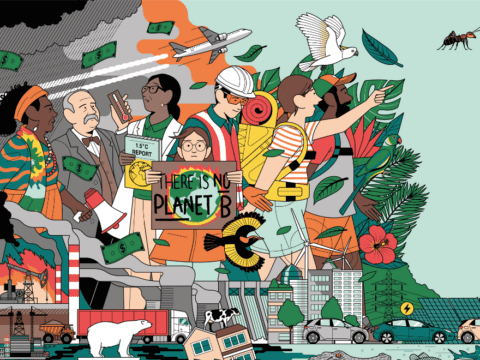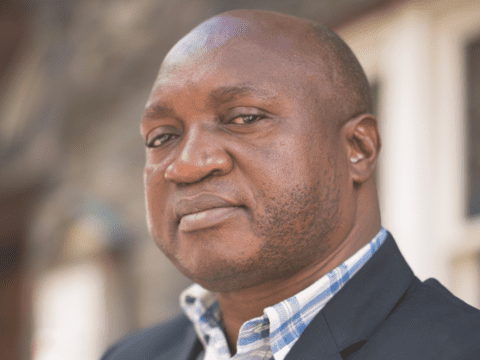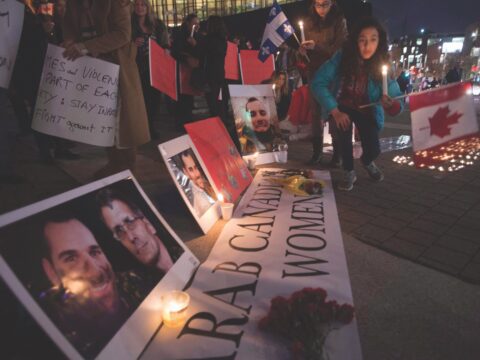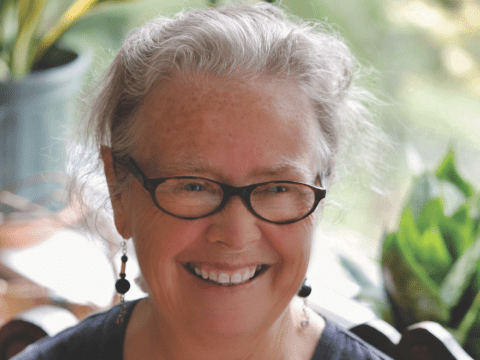On a Wednesday evening a little over a year ago, 150,000 people huddled in the rain in St. Peter’s Square at the Vatican, waiting to learn the identity of the newly elected pope. At last a senior cardinal stepped out on a balcony overlooking the square and solemnly announced, “We have a pope! The most eminent and most reverend lord, Lord Jorge Mario, Cardinal of the Holy Roman Church, Bergoglio.”
Jorge Mario Bergoglio emerged then, but he looked neither solemn nor lordly. Observant Catholics were surprised that the new pope was not wearing the customary ceremonial vestments, such as the mozzetta, a red-velvet cape trimmed with white ermine fur, and the gold-embroidered papal stole. Instead, he sported a plain white cassock. The traditional gold pectoral cross was missing too. He was wearing an old iron one. The new pope smiled and waved and cracked a joke in Italian.
He was supposed to give the crowd the formal Urbi et Orbi (“to the city and to the world”) blessing, but he asked people to pray for him first. After a minute, he lifted his head and blessed everyone as promised, then he cheerfully bid them an informal “good night and good rest.”
The modesty and warmth of the new pope struck many onlookers that night. And Francis — the papal name he chose for himself — would soon capture the attention of the world, enthralling even people who don’t normally follow religious leaders.
One year later, the outsize enthusiasm for Pope Francis shows no sign of waning. Time magazine named Francis its 2013 “Person of the Year.” Facebook announced that he is the “most talked about” individual in the world, edging out Great Britain’s royal baby and U.S. pop star Miley Cyrus. In February, the pope’s smiling face appeared on the cover of Rolling Stone magazine. Among U.S. Catholics, a famously fragmented bunch, he enjoys an unheard-of 90 percent approval rating.
What’s going on here? Why is the pope so popular?
For starters, Francis is the first-ever Latin American pope, and he is the first non-European pope in 1,300 years. Catholics from the Southern Hemisphere are delighted that one of their own has finally assumed leadership of their church — especially since 41 percent of the world’s Catholics now live in Latin America and the Caribbean.
Moreover, Francis is the first Jesuit pope, a member of the largest Catholic religious order of men. The election of a pope from any religious order is an uncommon occurrence. Of the 266 popes to date, only 34 have belonged to a Catholic religious order. Most popes are chosen from an abundant supply of candidates who have risen up the ecclesial ladder one rung at a time, beginning in their local dioceses. Choosing a Jesuit pope signalled a significant shift on the part of the cardinals who elected him. Highly educated and committed to working with people on the outer margins of society, Jesuits eschew careerism and occasionally have run afoul of the Vatican hierarchy. Previous popes have interfered in Jesuit affairs or suppressed the order — seizing or closing Jesuit schools, houses and church buildings, and banishing the missionaries.
Rev. Thomas J. Reese, a senior analyst for the National Catholic Reporter in the United States and himself a Jesuit priest, believes the pope’s popularity has a great deal to do with his religious humility and Gospel spirit. “This is a guy who has yet to refer to himself as pope. He calls himself the Bishop of Rome. And he stresses the straight Gospel message. Instead of talking about rules and regulations, instead of splicing doctrinal hairs, Francis cuts to the core. He stresses Jesus’ message about God’s love for us, and how we should then love one another as brothers and sisters with special concern for the poor. This is a message that any church can understand and anyone can relate to.”
Two weeks after his election, Francis broke with tradition by refusing to live in the lavish Apostolic Palace. He arranged instead to move into the modest Vatican guesthouse nearby, saying it would allow him both to live in community and to mingle with guests coming in for meetings. “I need to live among people, and if I lived on my own, perhaps a little isolated, it wouldn’t do me any good,” he said.
Gone, too, are his predecessor’s fancy cars — a custom-made Renault, a BMW X5 and a Mercedes. This new pope has been spotted driving himself around the Vatican grounds in a used Renault, circa 1984, and riding in the back seat of a Ford Focus. On his 77th birthday, he organized a breakfast party with a small group of aides and three homeless men, one of whom brought along his dog.
The new pope is also a “green” pope with a background in science; he chose the name Francis, after Saint Francis of Assisi. “One of the things we remember about Saint Francis is his love of Creation, his love of nature,” says Reese. “We have statues of him with birds and other animals, which is quaint, but Saint Francis calls us to develop a serious theology of Creation and a theology of the environment. You know this pope is not going to be a climate-change denier.” Reese says there are rumours that the environment will be the topic of the pope’s next encyclical — among the most authoritative of papal documents.
Last November, the pope gathered his thoughts on the church’s mission and the poor in his first apostolic exhortation, The Joy of the Gospel. The pope’s direct, colourful language and obvious passion for his subject make for a surprisingly good read. In one section, Francis decries “the idolatry of money” and calls unfettered capitalism “a new tyranny.”
He writes, “Just as the commandment ‘Thou shalt not kill’ sets a clear limit in order to safeguard the value of human life, today we also have to say ‘thou shalt not’ to an economy of exclusion and inequality. Such an economy kills. How can it be that it is not a news item when an elderly homeless person dies of exposure, but it is news when the stock market loses two points? This is a case of exclusion. Can we continue to stand by when food is thrown away while people are starving? This is a case of inequality. Today everything comes under the laws of competition and the survival of the fittest, where the powerful feed upon the powerless. As a consequence, masses of people find themselves excluded and marginalized: without work, without possibilities, without any means of escape.”
Basilian Rev. Thomas Rosica, the CEO of Canada’s Salt and Light Catholic Media Foundation and television network, assists the Holy See Press Office with English-language media relations. He describes the past year as “a new springtime” in the church. “Pope Francis has shown us that he is a moral leader who’s speaking not only to Catholics, but to Christians of other denominations and to world leaders. His voice and his message have truly transcended the Roman Catholic Church. I think the reason why there is this fascination, this intense following and tremendous interest, is because people see in him somebody who walks his talk.”
Others are not so admiring. Rush Limbaugh, the conservative American radio talk-show host, labelled Francis a “Marxist.” A nonplussed pope eventually addressed the accusation in an interview with Italian newspaper La Stampa. “Marxist ideology is wrong. But I have met many Marxists in my life who are good people, so I don’t feel offended.”
The pope realizes that the Vatican itself must lead the way to financial reform by cleaning up its own scandal-plagued house. Shortly after his election, Francis appointed a commission to investigate the Vatican bank. Last October, the bank released an annual report — which wouldn’t be big news, except that it was the first public report in its 125-year history. Then, in January, Francis sacked four of the five powerful cardinals who oversaw the bank.
Francis is the first social-media-savvy pope. He knows that images of him embracing a disabled child or kissing a man with a disfiguring skin disease will circle the globe as quickly as he can flash his trademark smile. He’s not above posing for selfies, and last October, he surpassed 10 million followers on Twitter; @Pontifex regularly tweets nuggets such as, “The world tells us to seek success, power and money; God tells us to seek humility, service and love.” While he may be adored in the Twitterverse, critics on the ground complain that he hasn’t adequately addressed some of the most important issues in the church, such as the ongoing clergy sex abuse crisis. Nor has he shown any appetite for changing controversial church doctrines like the proscription on women priests.
Rosica affirms that Francis is not going to change the dogmatic, fundamental teachings of the church. But not all teachings are the same, he explains, and some can be interpreted and reinterpreted according to changing situations in the world.
Last July, a reporter asked Francis to comment on the Vatican’s so-called gay lobby. “Who am I to judge a gay person of goodwill who seeks the Lord?” the pope replied. “You can’t marginalize these people.” A few months later, the pope instructed all his bishops to ask their flocks what they think about church positions on issues such as cohabitation, artificial contraception, divorce and same-sex relationships.
Many Catholics are delighted that the “pelvic issues” are on the table again, and that a member of the hierarchy actually wants to know their opinion. Still, it is unclear how the pope and his officials will act on the results of the survey. One thing we know already: they won’t be responding to members’ views on women in the priesthood because the survey did not address this issue. Despite declaring that women should take on more responsibilities in the church, Francis has made it clear that on his watch, the door will remain closed to women priests.
U.S. Episcopalian author Phyllis Tickle is encouraged by the pope’s moves so far, but she questions whether he’ll have the time or the will to change Catholic teaching on hot-button issues such as homosexuality. “Francis is a politician,” she says, “and he’s shrewd enough to know how far he can push the envelope. As long as he’s pushing it on economic issues and talking about Christianity’s social stances or cultural stances, he’ll be all right. But I don’t know how far he’s going to get with issues related to women, sexuality or the modern family. He’s got lots of guts, and I hope he will have lots of glory, but he’s also driving a creaky machine.”
Thomas Reese is relieved the pope has opened the gates for a discussion about women in the church.
“I don’t expect Francis to start speaking feminist theology, but it’s terrific that he’s acknowledged the need to improve our theology in this area. The problem under Pope John Paul II and Pope Benedict XVI is that this kind of discussion was suppressed. They were both theologians, and so they felt everyone should automatically follow what they said. That doesn’t work anymore. It was a failed strategy. Now Francis is inviting the whole church into a discussion of the theology of women, and this is quite extraordinary because many people thought that Pope John Paul II had already developed a theology of women and had answered all the questions. Well, clearly, Pope Francis doesn’t think he did.”
Ultimately, Reese continues, “I think this discussion will be much more important than making a few ad hoc decisions, like making women cardinals. We need to learn from other churches and what they’ve done, but we have to be patient. We are a 1.1-billion-member organization with people in every country of the world, in every culture; we’re not all North Americans who have had their consciousness raised by feminists. So this is going to be a long endeavour, but if Francis can help the church move along, it will have ramifications all over the world. And if he can do it in a way that doesn’t divide the Catholic Church, that’s much more to the good.”
Canadian philosopher Charles Taylor also takes the long view, noting a “wrenching” shift from Pope Benedict defending the church as a threatened fortress, to Francis reaching out to the world and communicating the Gospel message.
“Francis has brought us back to the track we were on in Vatican II. Essentially this means no longer seeing the church as the core and inspiration of a civilized order, and the guardian of its morality and traditions, but rather as free from all social order and any particular group, as being charged with bringing the Gospel to all people,” Taylor says. “This is a very tall order to carry through on, and there will undoubtedly be problems, but the new direction is tremendously promising.”
***
This story first appeared in The United Church Observer’s April 2014 issue with the title “The Superpope.”

